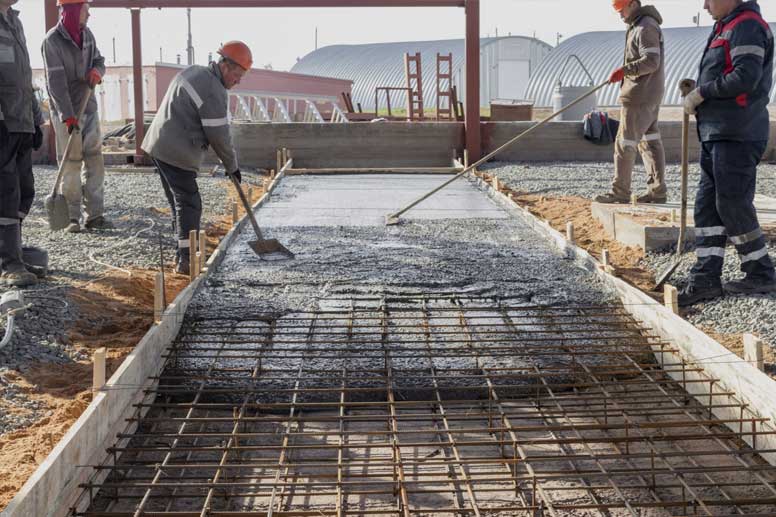Insurance for Concrete Contractors: Need-To-Know Guide

Table of Contents
Insurance for concrete contractors is a critical component of running a successful business. Concrete contractors face unique risks daily, from accidental property damage to employee injuries. Having the right concrete business insurance protects from financial setbacks, builds client trust, and ensures legal compliance.
In this guide, we’ll cover everything you need to know about concrete contractor insurance. Including the types of coverage available, how to secure it, and what it might cost.
Why Do Concrete Contractors Need Insurance?
Operating as a concrete contractor involves inherent risks that can lead to costly lawsuits, damages, or business interruptions.
Reasons why insurance is essential:
- Financial Protection: Insurance covers unexpected expenses, such as legal fees or repair costs, if something goes wrong.
- Legal Compliance: Many states require specific insurance coverage, like workers’ compensation, to operate legally.
- Credibility with Clients: Being insured reassures clients that they’re working with a professional and trustworthy business.
- Access to Larger Projects: Many larger clients and government contracts require proof of insurance before awarding jobs.
Pro Tip: Use tools like Invoice Fly’s Client Portal to securely store and share proof of insurance with potential clients.
RELATED ARTICLE: How To Start A Concrete Business?: A Step-by-Step Guide
Types of Insurance for Concrete Contractors
Here’s a breakdown of the most common types of insurance concrete contractors need:
1. General Liability Insurance
Protects your business from claims related to:
- Property damage
- Bodily injuries
- Legal fees
Cost: $500 to $1,500 per year
Example: If a client’s property is damaged while pouring concrete, general liability insurance can cover repair costs.
2. Workers' Compensation Insurance
Covers medical expenses and lost wages for employees injured on the job. Most states mandate this coverage option for businesses with employees.
Cost: $1,000 to $3,000 per employee annually
Example: If a worker is injured operating heavy machinery, workers’ comp ensures their medical payments and wages are covered.
3. Commercial Auto Insurance
Required for vehicles used for business purposes, such as transporting materials or equipment.
Cost: $750 to $2,000 per vehicle annually
Example: If a company truck causes an accident on the way to a job site, commercial auto insurance covers repair costs and liability.
4. Professional Liability Insurance
Also known as errors and omissions insurance (E&O). This policy covers claims related to professional mistakes or negligence.
Cost: $800 to $2,000 per year
Example: If a mistake in a project causes structural problems, this policy helps cover the costs of the fix
5. Tools and Equipment Insurance
Protects against theft, damage, or loss of essential tools and machinery.
Cost: $300 to $1,200 annually
Example: If a concrete mixer is lost, stolen, or damaged at a job site, equipment insurance can pay for a new one.
6. Umbrella Insurance
Provides additional liability coverage beyond your existing policies. Ideal for businesses working on large-scale projects.
Cost: $400 to $1,500 annually
Example: If a claim exceeds your general liability limits, umbrella insurance covers the remaining amount.
RELATED ARTICLE: How To Price Concrete Jobs in 8 Simple Steps? (2025)

How to Get An Insurance for Concrete Contractors in 5 Simple Steps
Step 1: Assess Your Needs
Evaluate your business operations to determine what coverage you need. Consider:
- The size of your projects
- The number of employees
- The types of equipment you use
Step 2: Compare Providers
Research reputable insurance companies that specialize in contractor coverage. Look for:
- Customizable policies
- Positive reviews from contractors
- Competitive pricing
Pro Tip: Always get multiple concrete contractor insurance quotes to ensure you’re getting the best deal.
Step 3: Bundle Policies
Many providers offer discounts when you bundle multiple types of insurance. For example, combining general liability and workers’ compensation can lower your overall costs.
Step 4: Secure Your Coverage
Once you’ve chosen a provider, gather the necessary documents, including proof of business registration and employee details. Ensure you understand the terms of your policy and what it covers.
Step 5: Review and Renew Annually
Needs change as your business grows. Review your policies annually to ensure they still meet your insurance requirements.
RELATED ARTICLE: How To Get Your Concrete License in the United States

How Much Does An Insurance Concrete Contractor Cost?
The cost of insurance for concrete contractors depends on several factors:
- Business Size: Larger businesses with more employees typically pay higher premiums.
- Location: Areas with higher risks, like hurricane-prone regions, may have higher costs.
- Claims History: A history of claims can increase your premiums.
- Coverage Types: The more policies you have, the higher your overall costs.
Average Annual Costs by Policy:
- General Liability: $500 – $1,500
- Workers’ Compensation: $1,000 – $3,000 per employee
- Commercial Auto: $750 – $2,000 per vehicle
- Professional Liability: $800 – $2,000
- Equipment Insurance: $300 – $1,200
Pro Tip: Use Invoice Fly’s Reporting Software to track expenses and manage your budget effectively.
RELATED ARTICLE: Concrete Worker Salary Guide in the U.S. (2025)
Is it Beneficial For Business Owners to Be Insured?
Yes. Protecting your concrete business with the right insurance is a smart investment. It ensures you’re prepared for unexpected challenges and positions your company as a reliable, professional operation.
Benefits include:
- Win More Bids: Clients often prefer working with insured contractors.
- Peace of Mind: Knowing your business is protected allows you to focus on growth.
- Legal Protection: Compliance with state laws prevents fines and work stoppages.
For more tools to simplify your business, explore Invoice Fly’s Concrete Estimating Software today.
Concrete Contractors Insurance FAQs
A set of policies designed to protect concrete contractors from financial losses. These are related to property damage, employee injuries, or legal claims.
The cost varies but typically ranges from $500 to $3,000 annually. Again, this is depending on the type of coverage and business size.
In most states, yes. Policies like workers’ compensation and general liability are often required by law.
Yes, many providers offer discounts when you bundle multiple policies.
Operating without insurance can lead to legal fines, client mistrust, and financial losses if an incident occurs.

